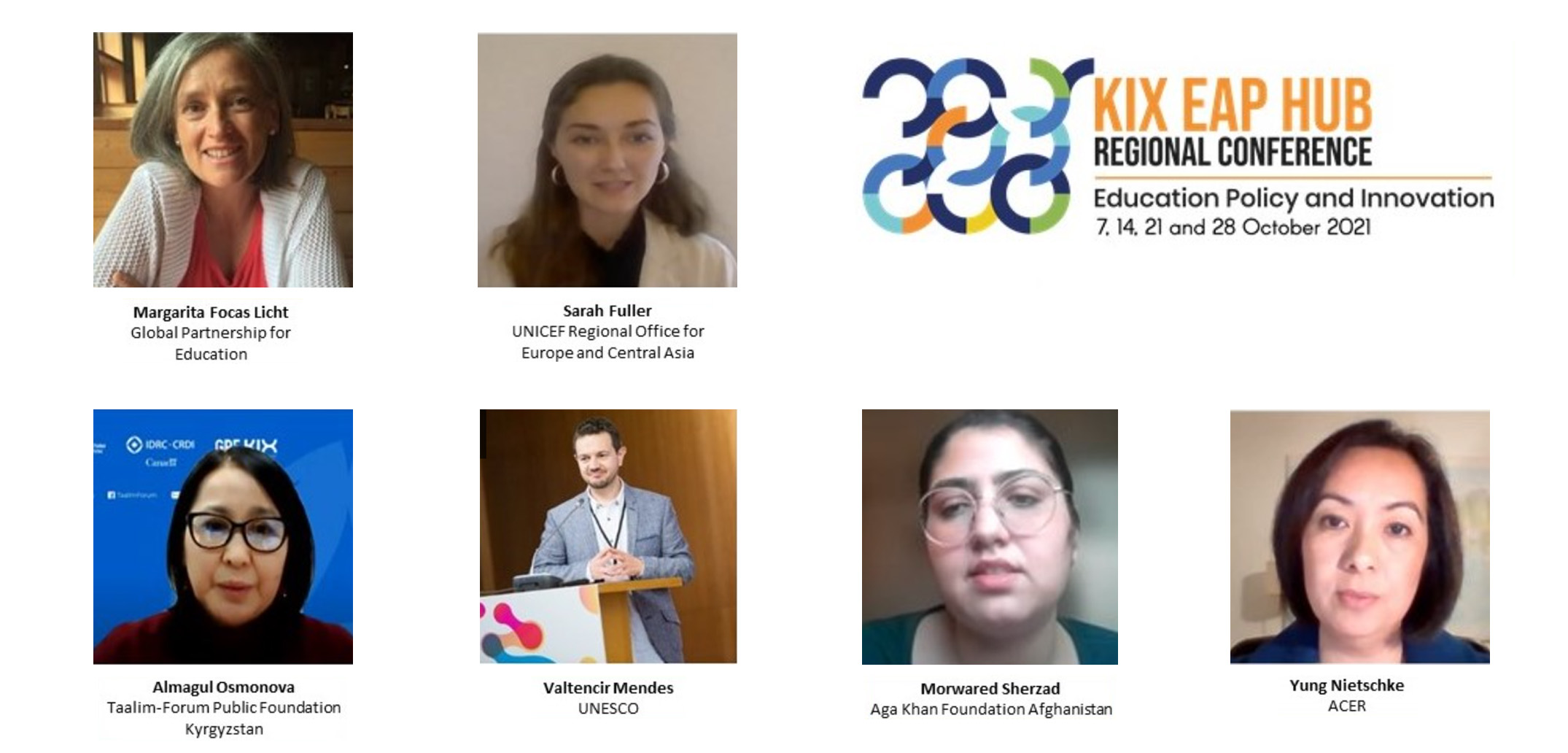
The first KIX EAP Education Policy Innovation Conference (EPIC) was a 4-day conference held on October 7th, 14th, 21st and 28th. The conference created a forum for intensifying dialogue between researchers, policymakers, and practitioners from Caucasus, Eastern Europe, Central Asia, and beyond.
Day one of EPIC paid attention to COVID-19 response and digital learning. The conference opened with a keynote address from Margarita Focas Licht, Manager of the Partnerships Team at GPE and Valtencir Mendes, Senior Education Programme Lead at UNESCO.
According to Ms. Licht, around 90% of the world’s learners, i.e., an unprecedented 1.5 billion students, were affected by the pandemic. She focused her address on detailing the different ways that GPE has supported partner countries’ response to the pandemic by mobilising stakeholders and creating opportunities for innovative educational approaches to reach the most marginalised groups. Building on this discussion, Valtencir Mendes gave an overview of the GPE-supported collaboration between the World Bank, UNICEF, and UNESCO on COVID-19 responses at the national, regional, and global level, which aimed to generate global public goods and build capacity.
The keynote address was followed by four thematic sessions.
Thematic session 1 focused on challenges and opportunities for education amid the COVID-19 pandemic. Jyldyz Doolbekova and Almagul Osmonova (Taalim-Forum) did the first presentation on education interventions in Kyrgyzstan, Mongolia, and Tajikistan in response to the COVID-19 pandemic. Assel Myrzakhmetova (Buketov Karaganda University) followed with a presentation on the information culture of the youth in Kazakhstan in the context of the pandemic. Iva Perkovic (Network of Education Policy Centers) delivered the third presentation that explored state policies concerning learning gaps, student wellbeing, and support for teachers and school leaders a year after the onset of the pandemic in 15 countries in Central Asia and the Caucasus. The final presentation by Tamta Grigolia (Ministry of Education and Science of Georgia) covered computer technologies during COVID-19 in the context of the education system in Georgia.
The thematic session 2 focused on the prospects of digitalization in education. Morwared Sherzad (Aga Khan Foundation Afghanistan) discussed how the Schools 2030 project used digital learning solutions to keep Afghan children in schools during the COVID-19 pandemic. Daniyar Kussainov and Gulnaz Kordanova (Connect-ed) followed with a presentation on their project Connect-ed that aims to bring digital equality among children in Kazakhstan. Next, Roza Mukanova and Nina Stukalenko (Orleu) tackled the issue of keeping up the professional development of teachers in the context of digitalization in education. Lastly, Pina Tarricone, Kemran Mestan and Ian Teo (ACER) introduced their policy monitoring framework and tools that aim to assist policymakers with managing teaching and learning risks during emergencies.
Thematic session 3 was on educational development in the digital age. The session started off with a presentation from Nurgul Abisheva and Natalya Trnabaeva (Orleu) addressing ‘cyberpedagogy’ and the need to study, develop, and introduce knowledge of cyber pedagogy into pedagogical practice. Next, Sarah Fuller (UNICEF) focused on support for teachers during emergency, addressing education responses to COVID-19 and implications for education system digitalization. Following this, Aziz Soltobaev spoke about ‘IlimBox’ – an educational platform for distance learning. Lastly, Elena Volkova, Aleksey Semyonov, and Gulnaz Bektemirova (Westminster International University, Uzbekistan) presented their paper on the feasibility of scaling an innovation in the Uzbekistan education sector, a study developed as part of the KIX EAP learning cycle on ‘Feasibility Study on Scaling Innovation’.
Thematic session 4 then focused on digital learning and teaching. The first presentation by Maia Bliadze and Nino Petviashvili (European University) highlighted two barriers in implementing a universal online education: unequal availability of internet connectivity and the emotional burnout of teachers. The second presentation by Yung Nietschke (ACER) and Reiko Take (DFAT) spoke about the project ASPIRE in the Indo-Pacific region to support learning continuity, access, and equity in response to COVID-19 school disruptions. The next set of presenters, Deniza Alieva (Webster University, USA) and Liliya Makovskaya (Westminster International University in Tashkent) shared their study on the feasibility of scaling the online platform ‘EduMarket’, which was written as part of the KIX EAP learning cycle ‘Feasibility Study on Scaling Innovation’. Following this, Leila Almagambetova (Orleu) did a presentation on video tutorials as an effective means of distance learning. The session ended with Garen Avanesyan’s (UNICEF) data-packed presentation on household-level readiness for remote learning.
